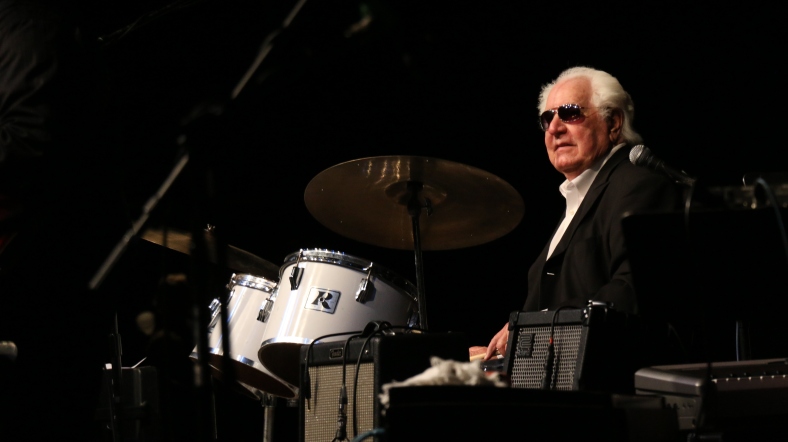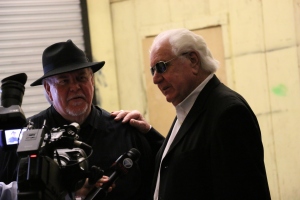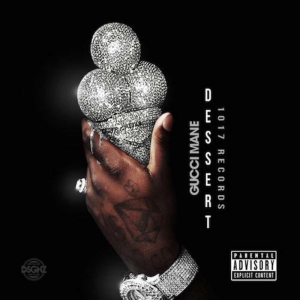
WS Holland performs at the Carl Perkins Civic Center in Jackson, Tennessee on Saturday, August 16, 2014. (John Connor Coulston)
“It’s just another one of those ‘fluke’ things.”
This is what WS “Fluke” Holland says when asked about the sessions for Carl Perkins’ “Blue Suede Shoes,” which was recorded 50 years ago this December.
As I enter his two-story Jackson, Tennessee home, the sprightly 79-year-old whose parents gave him only two letters for a name, leads me upstairs to an open room of memorabilia, filled with photos and items from his 60-year career in the music industry, including photos with both Jimmy Carter and Richard Nixon, gold records and two sets of what made it all possible—the drums.
“I started playing drums in nineteen-and-fifty-four,” Holland says. “One night, Carl, out of the clear blue sky, said, ‘We’ve got an appointment with Sam Phillips Thursday at Sun Records for a record audition. Borrow some drums and go with me.’”
Holland and Perkins met while growing up in the small town of Bemis, Tennessee just outside of Jackson. When Perkins and his brothers started performing, Holland would join them and keep time by tapping along on Clayton Perkins’ upright bass.
It was also in Bemis where he received his nickname, “Fluke.” He would often use the word “fluke” as a slang term for various objects, and a worker at a “filling station” he frequented coined the name. It carried on throughout his years in school and soon found a whole new meaning when he entered the music industry.
“I’ll show you something unusual about the drum playing,” he says, as he steps up to one of his drum kits. “I had never had seen a drum setup…I thought if I was playing the hi-hat (cymbal) with my right hand, it oughta be sitting on the right side.”
This “backward” way of playing is what gave him the versatility and playing style that caused him to be proclaimed “The Father of the Drums.”
“I’m glad I didn’t know,” he says. “It was a ‘fluke’ thing.”
In October 1955, WS, with less than a week of drumming under his belt, headed to Memphis with Perkins, who landed a contract that day. However, it wasn’t until the release of Perkins’ landmark single that he fully committed to a career in music.
“When ‘Blue Suede Shoes’ came out, I had to make a decision to either keep working on air conditioners or play in a band,” Holland says. “So, I decided to play in a band.”
He spent the next five years touring and recording with Perkins, including the legendary 1956 “Million Dollar Quartet” session, where Elvis Presley, Johnny Cash and Jerry Lee Lewis joined Perkins at the Sun Records studio before they all found success.
“People now will ask me, ‘Man, what was it like to be in the studio with all those big stars?’” he says. “And I say, ‘Hey, I wasn’t in the studio with any big stars that night.”
This landmark session was just another day for Holland. While most see Presley, Cash, Perkins and Lewis as icons, at the time he simply knew them as fellow musicians that were just trying to achieve success.
Now this is where his story takes a turn: Holland wanted to retire from music in 1960.
“I figured I had done all that I’d ever do: played on the ‘Blue Suede Shoes’ record, the Million Dollar Quartet session, toured all over the country, been in a movie, did “The Perry Como Show” and all the big TV shows, and I had met [my wife] Joyce.”
However, before he could call it quits, a musician called him up asking if he’d join him on tour.
“He didn’t have a drummer in the band, and he wanted me to go on a two-week trip,” Holland says. “I went for that two-week period and it lasted almost 40 years.”
The man who called was Johnny Cash.
“We’re gon’ be playing a big building in New York, and I’d like for you to go, cause I think we’re gonna need more noise,” Cash told him that day. “I’ve been hearing you play now since 1955, and you make a lot of noise.”
When asked what it was like to tour with Cash, to play the White House, to play on Cash’s iconic prison albums, “At Folsom Prison” and “At San Quentin,” the latter of which features Holland receiving a shout-out from Cash on the set’s closing medley before Holland bursts into resounding solo, his response is humble: these were just the latest in a long line of gigs for the band.
“At the time we were doing it, we didn’t think anything about it,” he says. “It was just another place to play. Even [during] the prison [shows] there was never any kind of a problem. We just went in and played the shows just like we played anywhere else.”

Ron Haney (left) and WS Holland (right) talk with ABC affiliate WBBJ before their show at the Carl Perkins Civic Center in Jackson, Tennessee on Saturday August 16, 2014. (John Connor Coulston)
When the touring stopped, Holland considered stopping as well. That was until he met his current bandmate/manager Ron Haney, who convinced WS to start his own band, aptly named “The WS Holland Band.”
The four-piece group currently tours all over the world, including stops in Canada, Denmark, Norway and throughout the U.S., playing Cash’s songs, as well as hits from Elvis, Perkins and other stars, to large crowds.
“I’m looking forward to starting my next 60 years,” he says with a smile.
TWEETS: Meet the man who played behind Johnny Cash for almost 40 years:
Blues Suede Shoes turns 50 this year; meet the man who played on the legendary track:



 “Dead Alive” (or “Braindead” as it’s known outside the U.S.) is a 1992 cult classic comedy/horror film directed by Peter Jackson (yes, THAT Peter Jackson) that many cinemaphiles say is one of the greatest comedy horrors and/or zombie films of all time.
“Dead Alive” (or “Braindead” as it’s known outside the U.S.) is a 1992 cult classic comedy/horror film directed by Peter Jackson (yes, THAT Peter Jackson) that many cinemaphiles say is one of the greatest comedy horrors and/or zombie films of all time.
